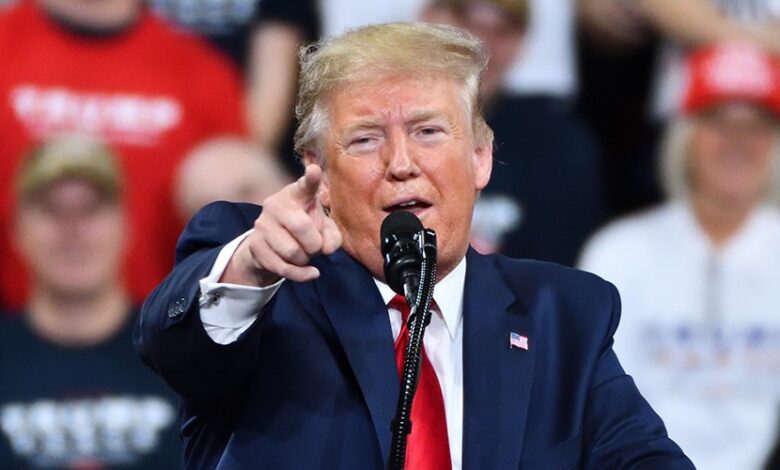How to Secure America’s Crypto Leadership

As Donald Trump prepares to take the oath of office and return to the White House, the world is watching with anticipation. His presidency begins at a time of immense economic transformation, with one of the most significant forces shaping the future being cryptocurrency and blockchain technology. What was once a niche interest for tech enthusiasts has now become a global financial and technological revolution. This revolution has the potential to redefine commerce, empower individuals, and reshape the role of governments in the digital age.
Cryptocurrency is no longer a fringe concept. As of 2023, the global cryptocurrency market is valued at approximately $1.2 trillion, with Bitcoin alone accounting for over $500 billion. At the end of 2024, it is around $3.3 trillion. Blockchain technology, the foundation of cryptocurrency, is being adopted by major corporations, governments, and financial institutions worldwide. Yet, despite its growing importance, the United States has struggled to provide clear regulatory frameworks, foster innovation, and assert its leadership in this space. If the U.S. fails to act decisively, it risks falling behind countries like China, which has already launched its own central bank digital currency (CBDC), or the European Union, which is advancing its comprehensive Markets in Crypto-Assets (MiCA) regulation.
President Trump’s administration has a unique opportunity to seize this moment and position the United States as a global leader in cryptocurrency and blockchain innovation. To achieve this, there are six critical steps that must be taken to ensure America’s dominance in this transformative sector.
Establish a Unified and Transparent Regulatory Framework
The lack of regulatory clarity in the United States has stifled innovation and driven many cryptocurrency companies to relocate overseas. Entrepreneurs and investors are frustrated by the inconsistent and often contradictory actions of federal agencies like the SEC and CFTC, as well as the patchwork of state-level regulations. For instance, the SEC’s lawsuits against major players like Ripple and Coinbase have created uncertainty, discouraging investment and innovation in the sector.
The Trump administration must prioritize the development of a unified regulatory framework that provides clarity and consistency. This framework should clearly define what constitutes a security, a commodity, or a currency in the cryptocurrency space. It should also establish straightforward guidelines for taxation, anti-money laundering (AML) compliance, and consumer protection. By doing so, the U.S. can foster innovation while ensuring that bad actors are held accountable.
We are all extremely proud of what we continue to accomplish in crypto. $Trump is currently the hottest digital meme on earth and I truly believe that @WorldLibertyFi will revolutionize DeFi/Cefi and will be the future of finance. We are just getting started! 🚀
— Donald Trump Jr. (@DonaldJTrumpJr) January 19, 2025
Accelerate the Development of a US CBDC & Establish a National Bitcoin Reserve
China’s digital yuan is already being used in cross-border transactions, and the European Central Bank is making significant progress with its digital euro. Meanwhile, the U.S. Federal Reserve has been slow to act, putting the dollar’s status as the world’s reserve currency at risk.
A US CBDC could enhance financial inclusion, streamline payments, and strengthen the dollar’s dominance in global trade. However, it must be designed with care to protect individual privacy and prevent government overreach. The Trump administration should work closely with the Federal Reserve to accelerate the development of a digital dollar, ensuring that it is secure, efficient, and aligned with American values.
Additionally, a strategic move would be to establish a national Bitcoin reserve, akin to gold reserves. This would not only acknowledge Bitcoin’s role in modern finance but also secure the U.S.’s position in global economic discussions regarding digital currencies. Such a move could stabilize markets, reduce the government’s reliance on traditional monetary systems, and signal a strong commitment to cryptocurrency’s future.
🇺🇸 $12 BILLION Bitwise CIO says US Strategic Reserve will push #Bitcoin to $500,000 🚀 pic.twitter.com/8DMlk86bsB
— Vivek⚡️ (@Vivek4real_) January 18, 2025
Promote Blockchain Innovation Across Industries
Blockchain technology is not limited to cryptocurrency—it has applications in supply chain management, healthcare, voting systems, and more. For example, Walmart has used blockchain to improve food safety by tracking the origin of produce, while IBM has developed blockchain solutions to streamline cross-border trade.
The administration should create incentives for companies to develop and adopt blockchain technology. This could include tax credits for research and development, grants for pilot projects, and public-private partnerships. By fostering innovation, the United States can ensure that it remains at the forefront of this transformative technology.
Protect Consumers and Promote Financial Literacy
The cryptocurrency market is rife with scams, hacks, and misinformation. SlowMist Hacked reported that 2024 saw 410 security incidents in the cryptocurrency space, leading to losses totaling $2.013 billion. Many Americans are drawn to the promise of quick riches but lack the knowledge to navigate this complex and volatile market.
The Trump administration should launch a nationwide campaign to promote financial literacy, with a particular focus on cryptocurrency and blockchain. This could include educational programs in schools, public awareness campaigns, and partnerships with industry leaders. Additionally, consumer protection laws should be strengthened to ensure that investors are not exploited by fraudulent schemes.
Lead International Collaboration on Crypto Regulation
Cryptocurrency is a global phenomenon, and unilateral action by the United States will not be enough to address its challenges and opportunities. Countries like Switzerland, Singapore, and the United Arab Emirates have already established themselves as crypto-friendly hubs, attracting talent and investment.
The administration should work with international organizations like the G20, the Financial Action Task Force (FATF), and the International Monetary Fund (IMF) to develop global standards for cryptocurrency regulation. By leading these efforts, the United States can ensure that its values—such as transparency, fairness, and innovation—are reflected in the global crypto landscape.
Ensure Banking Access for Crypto Firms
Crypto companies have faced significant hurdles in obtaining banking services due to regulatory ambiguity. Many financial institutions are hesitant to work with crypto firms, fearing potential legal or compliance risks. This lack of access to traditional banking services has stifled growth and created unnecessary barriers for legitimate businesses in the crypto space.
The Trump administration should issue an executive order to clarify banking access for crypto firms, ensuring that they are treated fairly and have the same opportunities as businesses in other industries. This action would foster an environment conducive to growth and stability, helping to integrate the crypto economy with traditional finance. By bridging the gap between these two sectors, the administration can enhance their resilience and innovation capabilities, ultimately strengthening the U.S. economy as a whole.
The cryptocurrency and blockchain revolution is here, and it is not waiting for anyone. The decisions made in the coming months will determine whether the United States leads this revolution or falls behind. By taking these six steps, the Trump administration can position America as a global leader in this transformative space, fostering innovation, protecting consumers, and ensuring that the benefits of this technology are shared by all.
The stakes are high, and the world is watching. Bold leadership and decisive action are needed now more than ever. The future of finance—and America’s place in it—depends on it.
As Donald Trump prepares to take the oath of office and return to the White House, the world is watching with anticipation. His presidency begins at a time of immense economic transformation, with one of the most significant forces shaping the future being cryptocurrency and blockchain technology. What was once a niche interest for tech enthusiasts has now become a global financial and technological revolution. This revolution has the potential to redefine commerce, empower individuals, and reshape the role of governments in the digital age.
Cryptocurrency is no longer a fringe concept. As of 2023, the global cryptocurrency market is valued at approximately $1.2 trillion, with Bitcoin alone accounting for over $500 billion. At the end of 2024, it is around $3.3 trillion. Blockchain technology, the foundation of cryptocurrency, is being adopted by major corporations, governments, and financial institutions worldwide. Yet, despite its growing importance, the United States has struggled to provide clear regulatory frameworks, foster innovation, and assert its leadership in this space. If the U.S. fails to act decisively, it risks falling behind countries like China, which has already launched its own central bank digital currency (CBDC), or the European Union, which is advancing its comprehensive Markets in Crypto-Assets (MiCA) regulation.
President Trump’s administration has a unique opportunity to seize this moment and position the United States as a global leader in cryptocurrency and blockchain innovation. To achieve this, there are six critical steps that must be taken to ensure America’s dominance in this transformative sector.
Establish a Unified and Transparent Regulatory Framework
The lack of regulatory clarity in the United States has stifled innovation and driven many cryptocurrency companies to relocate overseas. Entrepreneurs and investors are frustrated by the inconsistent and often contradictory actions of federal agencies like the SEC and CFTC, as well as the patchwork of state-level regulations. For instance, the SEC’s lawsuits against major players like Ripple and Coinbase have created uncertainty, discouraging investment and innovation in the sector.
The Trump administration must prioritize the development of a unified regulatory framework that provides clarity and consistency. This framework should clearly define what constitutes a security, a commodity, or a currency in the cryptocurrency space. It should also establish straightforward guidelines for taxation, anti-money laundering (AML) compliance, and consumer protection. By doing so, the U.S. can foster innovation while ensuring that bad actors are held accountable.
We are all extremely proud of what we continue to accomplish in crypto. $Trump is currently the hottest digital meme on earth and I truly believe that @WorldLibertyFi will revolutionize DeFi/Cefi and will be the future of finance. We are just getting started! 🚀
— Donald Trump Jr. (@DonaldJTrumpJr) January 19, 2025
Accelerate the Development of a US CBDC & Establish a National Bitcoin Reserve
China’s digital yuan is already being used in cross-border transactions, and the European Central Bank is making significant progress with its digital euro. Meanwhile, the U.S. Federal Reserve has been slow to act, putting the dollar’s status as the world’s reserve currency at risk.
A US CBDC could enhance financial inclusion, streamline payments, and strengthen the dollar’s dominance in global trade. However, it must be designed with care to protect individual privacy and prevent government overreach. The Trump administration should work closely with the Federal Reserve to accelerate the development of a digital dollar, ensuring that it is secure, efficient, and aligned with American values.
Additionally, a strategic move would be to establish a national Bitcoin reserve, akin to gold reserves. This would not only acknowledge Bitcoin’s role in modern finance but also secure the U.S.’s position in global economic discussions regarding digital currencies. Such a move could stabilize markets, reduce the government’s reliance on traditional monetary systems, and signal a strong commitment to cryptocurrency’s future.
🇺🇸 $12 BILLION Bitwise CIO says US Strategic Reserve will push #Bitcoin to $500,000 🚀 pic.twitter.com/8DMlk86bsB
— Vivek⚡️ (@Vivek4real_) January 18, 2025
Promote Blockchain Innovation Across Industries
Blockchain technology is not limited to cryptocurrency—it has applications in supply chain management, healthcare, voting systems, and more. For example, Walmart has used blockchain to improve food safety by tracking the origin of produce, while IBM has developed blockchain solutions to streamline cross-border trade.
The administration should create incentives for companies to develop and adopt blockchain technology. This could include tax credits for research and development, grants for pilot projects, and public-private partnerships. By fostering innovation, the United States can ensure that it remains at the forefront of this transformative technology.
Protect Consumers and Promote Financial Literacy
The cryptocurrency market is rife with scams, hacks, and misinformation. SlowMist Hacked reported that 2024 saw 410 security incidents in the cryptocurrency space, leading to losses totaling $2.013 billion. Many Americans are drawn to the promise of quick riches but lack the knowledge to navigate this complex and volatile market.
The Trump administration should launch a nationwide campaign to promote financial literacy, with a particular focus on cryptocurrency and blockchain. This could include educational programs in schools, public awareness campaigns, and partnerships with industry leaders. Additionally, consumer protection laws should be strengthened to ensure that investors are not exploited by fraudulent schemes.
Lead International Collaboration on Crypto Regulation
Cryptocurrency is a global phenomenon, and unilateral action by the United States will not be enough to address its challenges and opportunities. Countries like Switzerland, Singapore, and the United Arab Emirates have already established themselves as crypto-friendly hubs, attracting talent and investment.
The administration should work with international organizations like the G20, the Financial Action Task Force (FATF), and the International Monetary Fund (IMF) to develop global standards for cryptocurrency regulation. By leading these efforts, the United States can ensure that its values—such as transparency, fairness, and innovation—are reflected in the global crypto landscape.
Ensure Banking Access for Crypto Firms
Crypto companies have faced significant hurdles in obtaining banking services due to regulatory ambiguity. Many financial institutions are hesitant to work with crypto firms, fearing potential legal or compliance risks. This lack of access to traditional banking services has stifled growth and created unnecessary barriers for legitimate businesses in the crypto space.
The Trump administration should issue an executive order to clarify banking access for crypto firms, ensuring that they are treated fairly and have the same opportunities as businesses in other industries. This action would foster an environment conducive to growth and stability, helping to integrate the crypto economy with traditional finance. By bridging the gap between these two sectors, the administration can enhance their resilience and innovation capabilities, ultimately strengthening the U.S. economy as a whole.
The cryptocurrency and blockchain revolution is here, and it is not waiting for anyone. The decisions made in the coming months will determine whether the United States leads this revolution or falls behind. By taking these six steps, the Trump administration can position America as a global leader in this transformative space, fostering innovation, protecting consumers, and ensuring that the benefits of this technology are shared by all.
The stakes are high, and the world is watching. Bold leadership and decisive action are needed now more than ever. The future of finance—and America’s place in it—depends on it.



